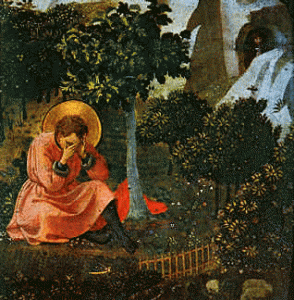In Book VIII of his Confessions, St. Augustine details his conversion. After begging the Lord to finally free him from enslavement to sin, he began to weep with bitter sorrow because he felt powerless to overcome it. He suddenly hears the voice of a child, almost in a sing-song voice, say “Take and read, take and read.” He reasoned that the voice had a divine source and immediately opened a book of the Epistles of St. Paul. Happening upon Romans 13:13-14, “let us live honorably as in the day, not in reveling and drunkenness, not in debauchery and licentiousness, not in quarreling and jealousy. Instead, put on the Lord Jesus Christ, and make no provision for the flesh, to gratify its desires”, the saint was immediately converted to Christ with “all the darkness of uncertainty vanishing away” (VIII, 29).
Augustine had learned this approach from St. Antony of the Desert whom he had read about. Antony entered a church and upon hearing the words of Christ to the Rich Young Man to sell your possessions, and give the money to the poor, and you will have treasure in heaven; then come, follow me” (Mt 19:21) did exactly as he was told. We might be tempted to think the men superstitious, playing a form of Scriptural Bingo. Except, that is, for the fact that we are talking about two saints. Let us then examine exactly what is going on there.
Faith in Sacred Scripture
In his Encyclical on Sacred Scripture, Providentissimus Deus, warned that “a thirst for novelty and unrestrained freedom” in Scriptural interpretation represented a great threat the belief in Sacred Scripture as the true Word of God. Scripture itself became victim to the cult of the expert and Scripture Scholars, rather than the Church, became authentic interpreters. The average Catholic comes to think Scripture above his paygrade so that, confused by the experts, he sets it aside. Faith in Sacred Scripture as the authentic Word of God, addressed not just to experts but to every man, was toppled.
The saints, including Antony and Augustine, believed in the public revelation contained in Sacred Scripture. But because it is God Who speaks, they also believed that Scripture was a vehicle of private revelation as well. This does not make them closet Protestants but fully Catholic. They believed that God also revealed Himself and His will to them personally through Sacred Scripture. To grasp this fully, we have to do some theology. “Doing” theology means that we take something we believe and work out the implications of it so that it becomes a real principle in our lives. We move from just believing it to real-izing it.
Real-izing Our Belief in Sacred Scripture
Catholics believe that the Holy Spirit is the true author of Sacred Scripture. To real-ize this we must first set aside the question of how inspiration works. It is not that this is an unimportant question, but that there is a tendency to over-play the hand that man plays in it. However it worked, we have to know that the Holy Spirit inspired the Sacred Author to say exactly what He wanted to say and how it was to be said. In other words, the Holy Spirit is the One Who is speaking, even if He is using a human mouthpiece. From this we can draw a couple of principles
- Every single word is both inspired—“all Scripture is inspired by God” (2Tim 3:16) and true—“He cannot deny Himself”(2Tim 2:13)
- Because it is God Who is doing the speaking Scripture is “living and active” (Heb 4:13)
This second principle likewise bears some explanation. Because it is God Who was speaking through St. Paul, He had foreknowledge of the fact that St. Augustine would read Romans 13 on the fateful day. The words contained within their meaning exactly what Augustine needed to hear to move his heart, opening it up to receive the grace of conversion. It is as if God Himself in that very moment spoke directly to St. Augustine telling him what to do.
The words therefore are more than a dead letter, they are also active. This means that like all of God’s words they are performative. They effect what they command. Augustine was not just reading something directed to him personally, the words themselves contained the power for him to “make no provision for the flesh.” It is the words themselves that move Augustine to convert. Whenever God commands, He also equips.
Augustine as Everyman
What happened to Augustine is really not unique in that regard. It is the same thing that is supposed to happen to each one of us every time we open our Bibles. Each time Christ told the Apostles “have no fear”, He wasn’t just telling them to calm down, but He was also taking away their fear. But not just their fear, but everyone who ever laid the eyes of faith upon Mark 6:45-52 while in a state of anxiety.

The Apostles knew Christ’s words had power because He had commanded a storm to cease with a single rebuke. We too must come to believe that same power flows from the same Word found in Sacred Scripture. This is what I mean by faith in Sacred Scripture. Once you real-ize that it truly is living—directed to you personally from the seat of Eternity—you can expect it to be active by causing something to change in you.
The problem is that there are forces at work trying to undermine this by turning Scripture into an academic subject and subjecting it to literary criticism without having faith in it living power. Ultimately this undermines faith by echoing Satan’s “did God really say?”. God really is speaking through Sacred Scripture, not just to mankind but to me here and now. Pray for the grace of an increase in faith in Sacred Scripture!

